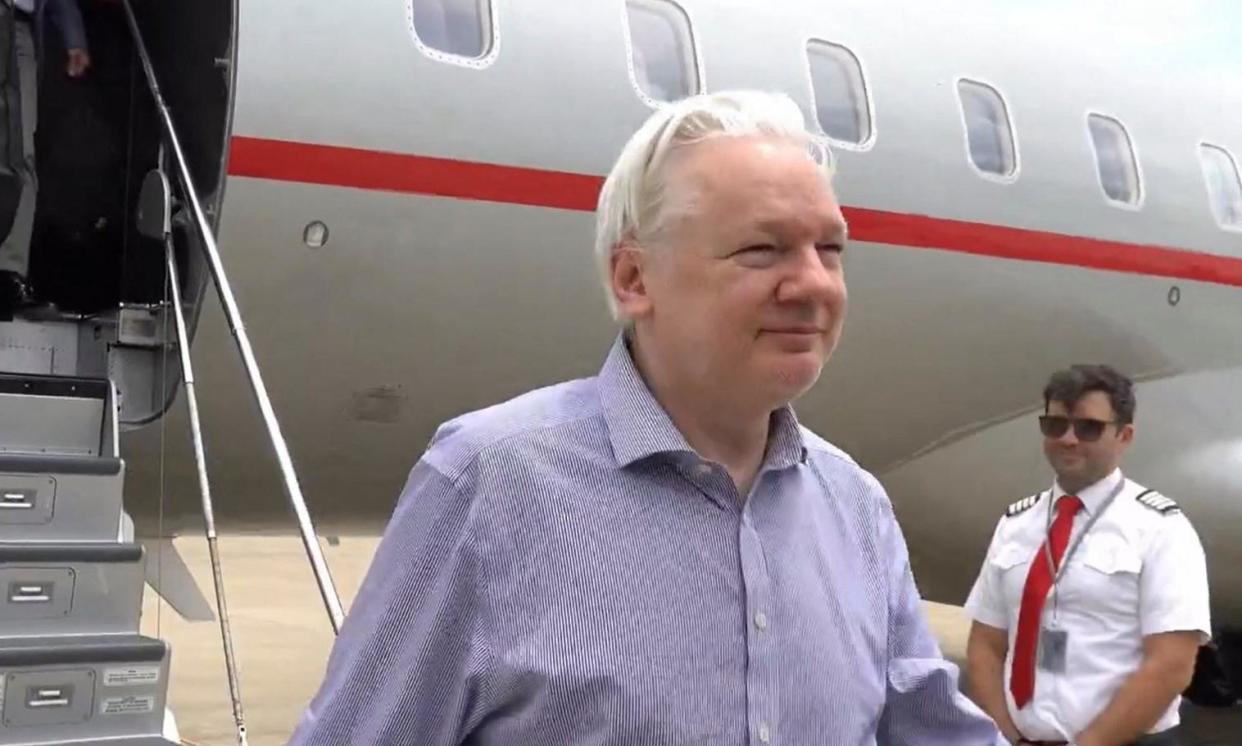Experts warn Julian Assange plea deal could set dangerous precedent

The next UK government must push the US for reassurance it will not pursue journalists for publishing classified information, human rights organisations and experts have argued after the release of Julian Assange.
Experts have warned that the plea deal struck between the WikiLeaks founder and the US authorities – which will see him plead guilty to one charge under the Espionage Act, but avoid serving any additional time in custody – could set a dangerous precedent.
Assange, who has battled his extradition to the US since WikiLeaks published more than 250,000 leaked classified military and diplomatic documents in 2010, was facing up to 175 years in prison on 18 counts. He has spent the last five years in Belmarsh prison, and had sought refuge in the Ecuadorian embassy for seven years previous to that.
The International Federation of Journalists (IFJ) called his release a “significant victory for media freedom” with its general secretary, Anthony Bellanger, adding: “Had Assange gone to prison for the rest of his life, any reporter handed a classified document would fear facing a similar fate.”
But Seth Stern, director of advocacy for Freedom of the Press Foundation (FPF), said it was “alarming” the plea had been pursued. “The plea deal won’t have the precedential effect of a court ruling, but it will still hang over the heads of national security reporters for years to come,” he said.
It was a sentiment echoed by Stella Assange, who said her husband would seek a pardon after accepting the charge. “The fact that there is a guilty plea under the Espionage Act in relation to obtaining and disclosing national defence information is obviously a very serious concern for journalists and national security journalists in general,” she told Reuters.
The period after the deal was a time for “persistent advocacy … to ensure that uncovering the truth is never criminalised”, said Sabrina Tucci, a spokesperson for PEN International , while Séamus Dooley, the assistant general secretary of the National Union of Journalists, said the treatment of Assange highlighted the need “for global vigilance on the part of journalists”.
The timing of the decision, little more than a week before the UK general election, could indicate that a Labour government could influence its diplomatic allies, said the leading human rights barrister Geoffrey Robertson KC.
“I think that one of the factors in the Pentagon conceding was the imminence of a new government,” he said. “I think there was [a] recognition that the final decision would rest with a Labour government, friendly with the Australian Labor government, and not the Conservatives.”
Robertson, who acted for Assange and founded Doughty Street Chambers which has represented the WikiLeaks founder for more than a decade, said the Biden administration should now publicly indicate that it would not pursue journalists for carrying out their work, including the assurance that non-American journalists would be protected under the first amendment, which protects freedom of speech in the US.
In May, the UK high court granted the WikiLeaks founder permission to appeal against his extradition to the US, after it found that he might not be able to rely on the US first amendment and that he might be “prejudiced at trial” due to his nationality.
“The US government should make clear that it will not seek to argue again that the first amendment does not protect journalists from other countries,” said Robertson, adding that governments including the UK should lobby for this outcome.
Simon Crowther, an Amnesty International legal adviser, said the UK government had been “complicit” in the US’s pursual of Assange, which had done “historic damage” to global freedom of expression.
In June 2019, the then UK home secretary, Sajid Javid, signed the US extradition order for Assange. In March 2022, the UK supreme court refused Assange permission to appeal, and in June the then home secretary, Priti Patel, approved his extradition.
“Very early in the proceedings the secretary of state would have received the US extradition request, and had to decide whether or not to certify it. [The UK] could have nipped it in the bud at the very beginning without any kind of constitutional issues, and it didn’t,” Crowther said.
He called on any incoming UK government to push for measures to protect journalists, such as a new international treaty, convention or non-binding legal principles by an international body like the UN.
“I’d love to see the UK being at the fore of helping to mop up the mess that has been created by this case,” he said.
Other experts argued that the deal was unlikely to set a precedent, with the Labour peer Helena Kennedy KC saying it was “a pragmatic way of resolving a very challenging case”. Tim Dawson, the IFJ’s deputy general secretary, said that while accepting the charge might look like a dangerous precedent, “in practice, the case ending like this is a significant boost for press freedom”.
Robertson added: “I think everyone realises that it’s a diplomatic exercise to save embarrassment, rather than a legal decision […] It’s been a black eye for the Pentagon in this respect, and I don’t think they will be anxious to recreate it.”
Rebecca Vincent, director of campaigns at Reporters without Borders (RSF) said: “We would like to see a UK government that would sent a very different message if it was confronted with a case like this again and act in line with bolstering press freedom.”

 Yahoo News
Yahoo News 
